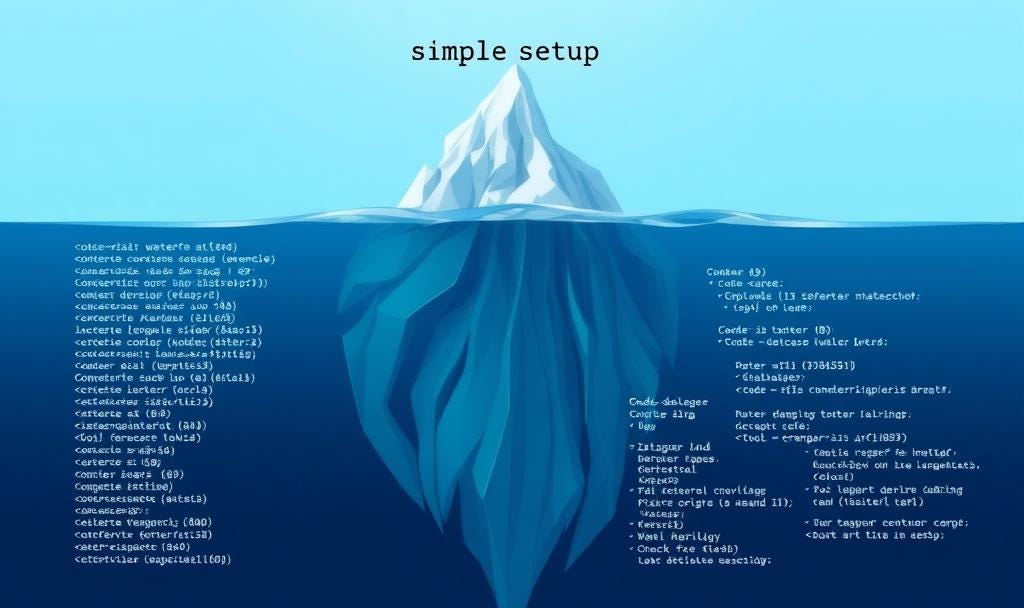A Gentle Rant: Stop Calling Complex Projects "Simple"
The hidden complexities of "simple" projects
I need to vent about something that's been bothering me across tech blogs, tutorials, and how-to posts. It's the casual use of words like "simple," "easy," "just," and "straightforward" to describe what are often genuinely complex technical projects. These terms are relative. What’s simple to you might be rocket surgery to me. Yes, I said rocket surgery. Brain science, too. That’s how complex it is!
The Setup That Sparked This Post
I recently read an article promising a "simple" AI automation setup to make my blog life even “easier.” The author wanted me to believe it was straightforward.
Straightforward to do what? I’m glad you asked. Straightforward and easy to:
Configure JSON files for MCP servers (I’m sorry, what?)
Write PowerShell scripts with Windows API calls (again, what?)
Set up Notion databases with proper authentication (Ok, I used Notion once)
Create multi-application automation workflows (how?)
Debug task scheduling and window management (sure, I have a can of Raid)
All of this was presented as "dramatically simpler" than previous methods.
My previous method was me. So, no. Not simpler.
Look, I'm not saying this isn't a cool project. It probably is; based on the fact that I understand exactly .045% of this, I’m guessing it’s pretty powerful.
But calling it "simple" does a disservice to the knowledge-base required, complexity involved, and the readers trying to follow along.
The Problem With "Easy"
Here's what happens when we mislabel complexity:
For beginners: They feel lost and confused when they can't follow the "simple" steps. They either assume everyone else finds this easy and something's wrong with them or now think you’re a terrible writer who doesn’t get the audience. Now you’ve lost a potential subscriber.
For experienced folks: They might skip over important details, thinking "oh, this is basic stuff" and miss crucial setup steps.
For the ambitious: They underestimate time commitments and get frustrated when their weekend project turns into a month-long debugging session.
What Authors Actually Mean
When tech writers say "simple," they might mean one of these things:
"Simple compared to the enterprise solution I was using before"
"Simple once you understand the 47 prerequisites I'm not mentioning"
"Simple because I've forgotten how long it took me to learn this"
"Simple in concept (though complex in execution)"
The problem is they've compressed months of learning, failed attempts, and accumulated knowledge into "just follow these steps!"
The Anatomy of truly "Simple"
A truly "simple" technical project might involve:
Copy and paste one configuration file
Run a single command
Maybe restart an application
But most "simple" tutorials actually require:
Background knowledge of APIs, authentication, file systems
Comfort with command line interfaces
Debugging skills when (not if) things go wrong
Time to research unfamiliar concepts
Patience for trial-and-error troubleshooting
What Honest Technical Writing Looks Like
I'd love to see more posts that say:
"This is a powerful automation that took me two weeks to perfect. You'll need intermediate scripting comfort and should budget a weekend for setup. Here are the three places I got completely stuck and how I solved them."
Or:
"Fair warning: this involves JSON editing, API tokens, and system-level scripting. It's rewarding if you enjoy technical tinkering, but definitely not a quick afternoon project."
This isn't discouraging; it's respectful. It respects readers' time, intelligence, and right to make informed decisions about what projects to tackle. It’s also setting the reader up for success and building trust with your readers.
The Expertise Curse
I think authors genuinely forget how much they know. When you've spent years building technical skills, certain things do become automatic. You forget that "just edit the JSON configuration" assumes knowledge of:
What JSON is
Where config files live (and what they are)
How to avoid syntax errors
What to do when it doesn't work
How to troubleshoot permission issues
It's not malicious; it's just the curse of expertise. Once you know something well, it's hard to remember not knowing it.
A Better Way Forward
What if we normalized saying:
"This is intermediate-level and assumes you're comfortable with ..."
"Budget 3-4 hours for setup and testing"
"You'll likely hit these common snags ..."
"This is complex but powerful; here's what you're signing up for"
These descriptions are still compelling. They might even be more compelling because they're honest about the journey. Many people love a challenge. Most people appreciate the honesty.
My Plea to Technical Writers
Please, let's retire "simple" and "easy" unless projects actually are simple and easy. Your readers will thank you for the honesty.
Instead of hiding complexity, celebrate it. Say "this is sophisticated" or "here's an advanced technique" or "this is worth the learning curve." Embrace your abilities, showcase them, and let everyone know how you accomplished the great things you create.
Give people the information they need to decide if a project fits their skill level, timeline, and patience. That's not gatekeeping—that's good writing.
I'm not advocating for discouragement or elitism. I love that people share complex projects and make them accessible. But there's a difference between accessible and simple.
Accessible means: clear explanations, good documentation, acknowledgment of prerequisites, and honest time estimates.
Simple means: actually simple.
Let's bring back honest technical writing. Our readers—and our own credibility—deserve it.
What's your experience with "simple" tutorials that turned into weekend debugging marathons? I'd love to hear your stories in the comments.


